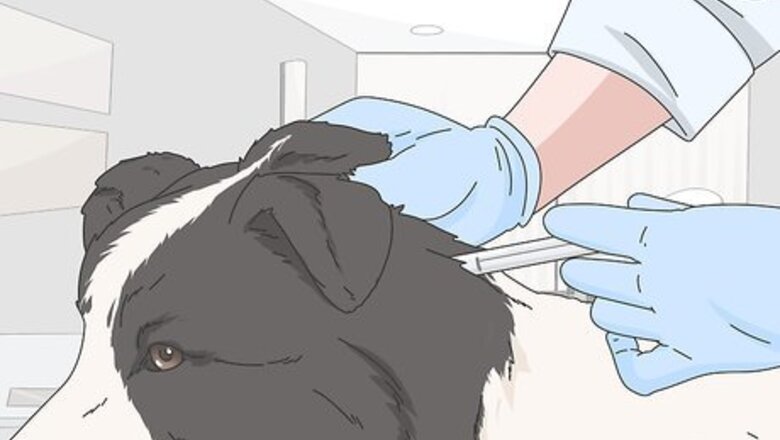
views
Getting Vaccinations and Packing Up
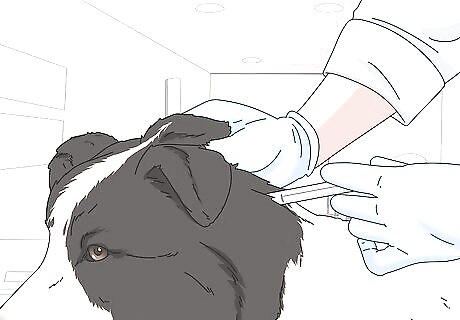
Make sure your dog has all of their vaccinations. It is important to make sure your dog will be happy and healthy during their travels. Take your dog to the vet to make sure they are up to date on their vaccinations so that they are protected against any new germs they may come into contact with. Vaccines for rabies, canine hepatitis, and canine distemper are all standard. Check if there are any diseases your dog could catch in the areas where you’re traveling. If there are, ask your vet about getting the proper vaccinations for your dog. Look for information about ticks or sandflies in the area to see if you need to take special precautions with your dog.Tip: Keeping your dog up to date with vaccinations is good practice in general and can help to prevent illnesses in the future.

Have your vet prescribe your dog medication for motion sickness. If you’ve taken your dogs on shorter car rides before, you may have noticed that they get sick from the motion of the car. Ask your vet if they could prescribe something for your dog to help ease their stomach while in motion. Most often this is a pill that you give your dog every few hours during a car or plane ride. Do not give your dog medication unless it has been prescribed by a veterinarian.
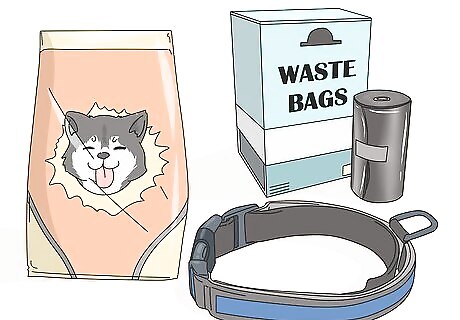
Pack up the essentials for your dog in an easy-to-access bag. Every dog is different and requires different essential items. Make sure you have your dog’s food, some water, 2 dishes, their leash and harness, poop bags, toys, and treats in a bag. Keep this bag in an easy-to-reach space so you can take items out as you need them on your trip. Be sure to pack any medication that your dog takes so you have enough for the entire trip. If your dog has a medical condition, get a copy of their medical history from your vet in case there’s an emergency. Make sure the history includes any diagnoses, tests done on your dog, and the medication dosages it needs. Make sure to bring the pets up to date vaccination records, in case your pet shall bite someone. The records will show that there's no concern for the person's health.
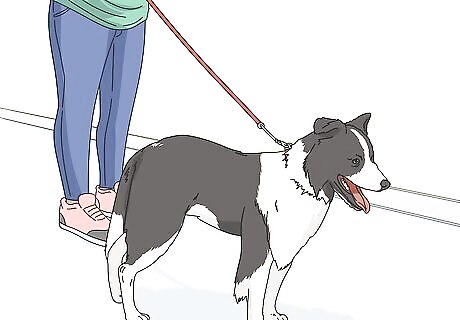
Tire out your dog with a long walk before you start your journey. Dogs have a lot of pent up energy, especially if they are young. Take your dog on a walk or a hike to exercise and tire them out. This can help with any nervous energy they may have as well. It might also be nice to stretch your legs before your journey. Consider getting your dog microchipped before you travel so someone can identify them if they run away or get lost.
Traveling in the Car
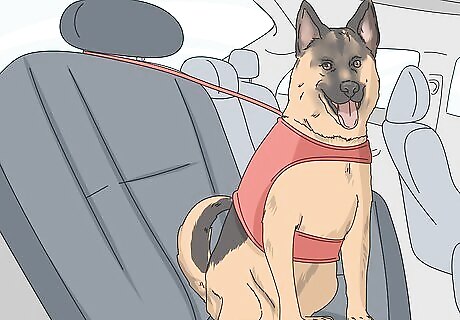
Buckle your dog in with a harness or dog seat belt. Dogs shouldn’t be allowed to roam around in the car while it is moving since they can provide distractions or be hurt in the event of an accident. Set up a dog harness, seat belt, or crate restraint for your dog in the car so that they remain seated and in 1 place during your travels. Small dogs can sit in a crate that is attached to a seatbelt, while larger dogs can be buckled in through their harnesses. If you do use a crate in the car, make sure it is large enough for your dog to comfortably turn around in. Ensure any restraints or harnesses you use have been crash-tested so you know they’re safe in case of a collision.

Lay down a blanket or dog bed to keep your dog comfortable. If you aren’t using a crate and your dog will be sitting directly on the seats of your car, put down a blanket or a dog bed that they like to make them feel more at ease. Use something that they like to lay on at home so it smells like them. Putting down a blanket or a dog bed will also help to protect the seats in your car. Have plastic bags and cleaning supplies handy in case your dog has motion sickness. Make sure you have enough bags to clean up after your dog for when you stop to let it out.
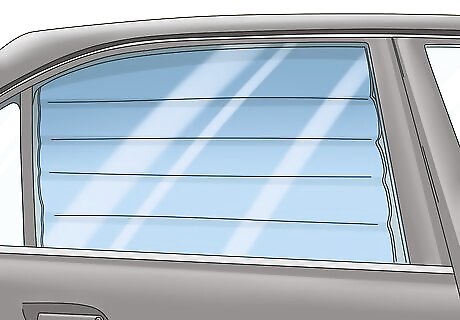
Put up window shades to keep your dog out of the sun. If you are traveling in the summer, your car might heat up with the sun. If you want to keep your dog out of sunspots, put up some window shades in the back seats. These shades tint your windows slightly and help to cool down your entire car. If your windows are tinted, you probably don’t need added sun shades. If it’s really hot out, keep the windows open or turn on the air conditioning so your dog doesn’t get overheated.

Give your dog a toy or a bone to keep them entertained. Dogs can get bored just like humans do. If your dog isn’t tired enough to sleep in the car, give them something to chew on to entertain them. If it’s a long car ride, it probably won’t keep them busy the whole time, but it can work for a few hours. You can also keep the radio on if your dog likes to listen to music.
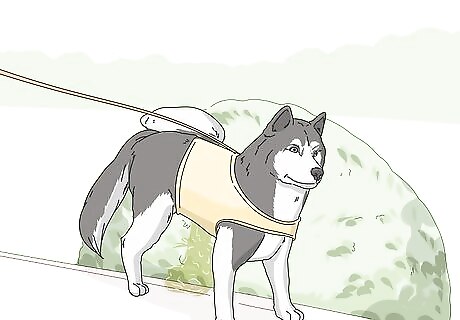
Pull the car over every 2 hours for a bathroom break. Dogs tend to urinate more during car rides because their anxiety levels are higher. Make sure you give your dog many opportunities to do their business, especially if you are in the car for a long time.Tip: Many rest stops have designated pet areas where you can let your dog go to the bathroom. Make sure to bring bags to pick up any poop.

Feed your dog on their normal schedule. If your dog eats twice a day, be sure to offer them food in the morning and the evening even while you are traveling. Keep them on their normal feeding schedule so that they don’t get hungry. Your dog may not be hungry in the car. Offer them food just in case they want to eat it later.
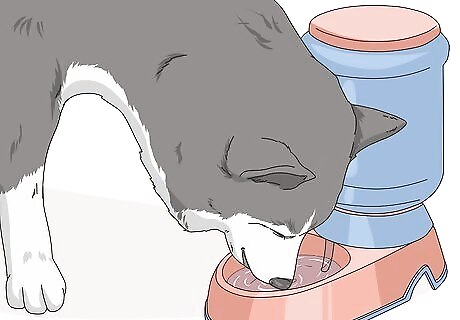
Offer your dog water once an hour. It’s extremely important to keep your dog hydrated while they are in the car. Bring a water bottle and a small dish that your dog can drink out of when they are in the car. Offer water to them about once every hour, or more if it is hot out. Depending on the length of your car ride, you may need to bring multiple bottles of water or refill them as you go.
Flying in a Plane
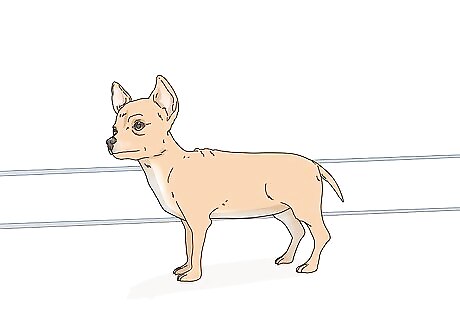
See if your dog is small enough to fly in the cabin with you. In order for dogs to fly in the cabin of a plane, they need to be small enough to fit in a carrier that can fit underneath the seat in front of you. Check with your airline to see what the weight restrictions are for your flight and whether or not your dog meets them. If your dog can’t fit in a carrier under the seat they will have to ride in the cargo hold of the plane, which can be dangerous.
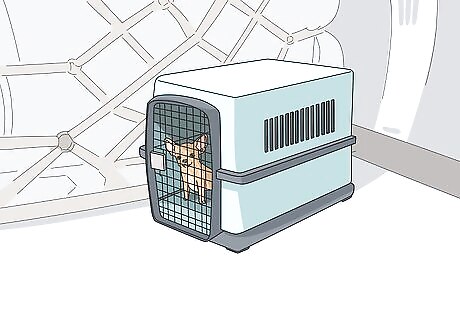
Consider the risks of having your dog fly in the cargo hold if they can't fly in the cabin. If your dog is too big to fly in the cabin with you, they will have to fly in a crate in the cargo hold. Cargo holds are not kept very warm or pressurized, so if your dog is old or frail, you shouldn’t risk it. If you are taking multiple flights, you may not want to have your dog fly in the cargo hold since they could get lost or misplaced more easily. Try to choose direct flights so your dog doesn’t have to be transferred as much. Opt for flights in the early morning or late evening so your dog doesn’t overheat if the plane is stuck on the tarmac. Some airlines don’t allow breeds that may have difficulty breathing into the cargo hold. This may include flat-faced breeds, such as Pekingese, pugs, or boxers.

Check with your airline to see what their pet restrictions are. Most airlines require you to pay a small fee to bring a pet onto an airplane. Contact your airline before your trip and ask if they have any special vaccination or carrier requirements. Most airlines will require you to show proof that your dog is up to date on its vaccinations.
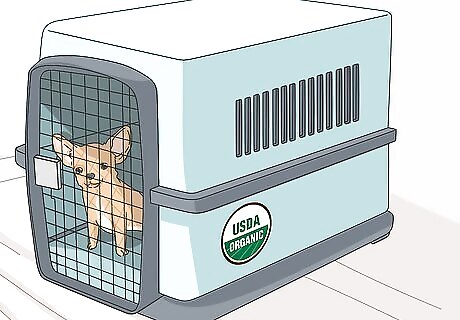
Purchase a USDA-approved crate if your dog will be flying in the cargo hold. If your dog is too large to fly in the cabin with you, make sure the crate they will be staying in is large enough for them to turn around and lay down in. The US Department of Agriculture, or USDA, checks animal crates for safety, so look for one with their stamp of approval. Pad it with a small blanket or dog bed so that your dog is comfortable. Put an item with your scent, such as an old T-shirt, in the crate to help your dog feel more comfortable. Get the travel crate a few weeks or months before you plan on leaving so your dog can get used to going inside of it.
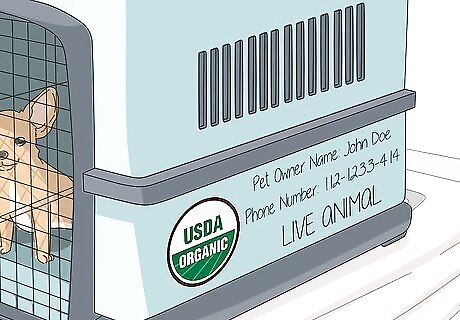
Write your name, phone number, and “LIVE ANIMAL” on their crate. Make sure that your crate can be easily identified in case it gets lost or separated from you. Use a permanent marker to write all of your information on the side of your dog’s crate in case of emergency. You can also carry a picture of your dog with you in case they escape their crate.
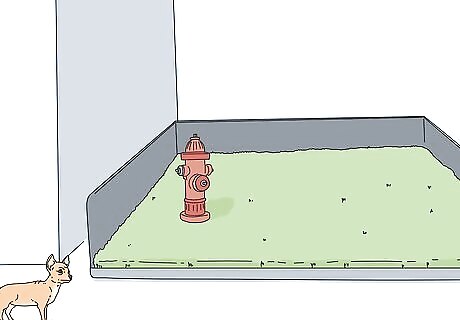
Take your dog to a pet relief station before you board. Most airports have a pet relief station where you can take your dog to go to the bathroom. 10 to 15 minutes before you board your flight, take your dog so that they can use the restroom before a long flight. You can also use this area to give your dog a few minutes of exercise before you board your flight.
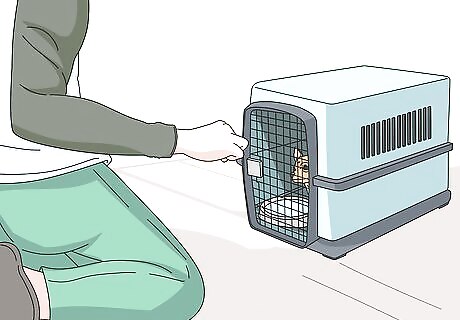
Offer your dog water at least once per hour if they're in the cabin. Dogs get more dehydrated when they are stressed. Be sure to take some water and a small dish on the plane with you and offer your dog water as often as you can. Open their crate slightly to fit their dish. Bring an empty water bottle with you in your carry-on and fill it up after you go through security to take water onto the plane with you.
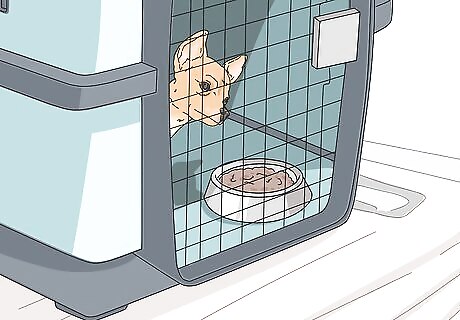
Put a dish of dog food into your dog’s crate. Your dog might get hungry during your flight. Keep a small dish of dry dog food in their crate so that they can eat if they want to. They may be too stressed to eat, but it’s always good to give them the option.
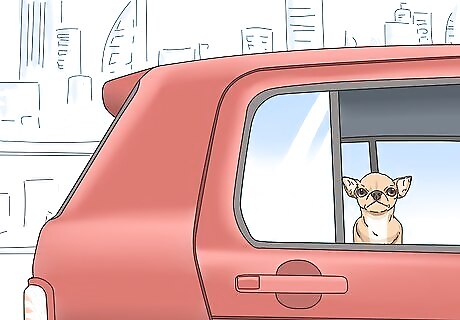
Consider taking your dog in the car instead of a plane. Taking your dog on a plane is stressful for them and can even be dangerous for breeds with flat faces, like pugs and bulldogs. Take your dog on a car ride or leave them at a dog boarder whenever possible.Warning: If your dog is too large to fly in the cabin with you, you should consider alternatives to placing them in the cargo hold of your flight. Cargo holds are stressful environments and dogs can be hurt or lost within them.




















Comments
0 comment